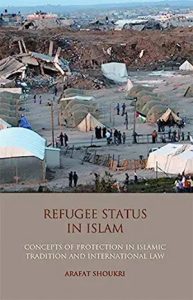Refugee Status in Islam: Concepts of Protection in Islamic Tradition and International Law

Author: Arafat Madi Shoukri
Publisher: I.B. Tauris
Year of Publication: 2010
Print Length: 288 pages
Genre: Islamic Studies / Islamic Law & Jurisprudence, Quranic Studies, Theology, Ethics and Philosophy; Non-Fiction / Law, Migration & Refugee Studies
Area: Middle East
Topic: Qur’an, Islam, Prophet Muhammad SAW, The Status of Refugees, Refugees & Forced Migration, Asylum & Asylum Seekers; Law, Jurisprudence, Legal Theory; International Law, Fundamental Rights and Liberties, Human Rights, Policy & Practice, Politics & Power, Responses to Refugees, Refugee Status Determination, Refugee Livelihoods, Protection, Safety, Discrimination, Expulsion, Legality & Illegality, Land & Property, Law Enforcement, Freedom to Move and to Stay, Movement of People and Ideas, Naturalization, Non-Refoulement, Religion
What are the views, principles and regulations of the Islamic tradition concerning refugee status? Are there any similarities between the Islamic tradition relating to the laws of aman (safe conduct) and the 1951 Geneva Convention relating to the status of refugees?
In this book, Arafat Shoukri delves into fifteen centuries of Arab and Islamic history examining hundreds of ancient sources to establish Islam’s position on refugees. This is the first examination of the 1951 Geneva Convention on refugees from an Islamic perspective. In adopting this approach, Shoukri is able to compare and contrast the principles of international law with those of the Islamic tradition.
Table of Contents
Acknowledgements
Introduction
1. The Jiwār in the Jāhiliyya
Introduction
‘The definition of jiwār
The reasons for asking jiwār
Rights and duties of the mustajīr
Persons from whom jiwār may be requested
The termination of jiwār
The continuity of the jiwār to the modern age
2. Jiwār in the Islamic Tradition in the Meccan Period
Heaven’s protection of the Prophet
The journey of the Prophet to al-Ṭāif
The migration to Abyssinia
The migration to Medina
3. Amān (safe conduct) in the Islamic Tradition
Dār al-ḥarb and Dār al-Islam
The definition of the term mustajīr
The definition of the term muhajīr
The definition of the term musta’min
Dhimmīs in the Islamic tradition
The interpretation of verse 9:6 and its relation to amān
4. The 1951 Geneva Convention relating to the Status of Refugees in the light of the Islamic Tradition
Definition of the term ‘refugee’ (Article 1)
Exclusion clauses
Prohibition of expulsion or return: ‘refoulement‘ (Article 33)
Non-refoulement in the Islamic tradition
The safety of musta’min
General obligations (Article 2)
Non-discrimination (Article 3)
Religion (Article 4)
Personal status (Article 12)
Movable and immovable property (Article 13)
Right of association (Article 15)
Access to courts (Article 16)
Gainful employment (Articles 17, 18 and 19)
Welfare (Articles 20, 21, 22, 23, and 24)
Freedom of movement (Articles 26, 27, 28, and 29)
Refugees unlawfully in the country of refuge (Article 31)
Expulsion (Article 32)
Naturalization (Article 34)
Recommendations
Notes
Bibliography
Index

Arafat Madi Shoukri is a senior researcher at Al Jazeera Centre for Studies (AJCS). He received his MA and PhD in oriental studies from the School of Oriental and African Studies (SOAS), University of London in 2008. He is an expert in migration in the Middle East and has published two books about this topic. He has more than ten years experiences in public and international relations in Europe through different European institutions and organising many big events. He held the position of the executive committee of the World Media Summit hosted by Aljazeera Media Network in Doha. His recent academic work focuses on the International Humanitarian Law concerning the refugees.
Source: https://studies.aljazeera.net/en/profile/arafat-shoukri & https://qa.linkedin.com/in/arafat-shoukri-322aba121
More from Arafat Madi Shoukri in this library, click here.
